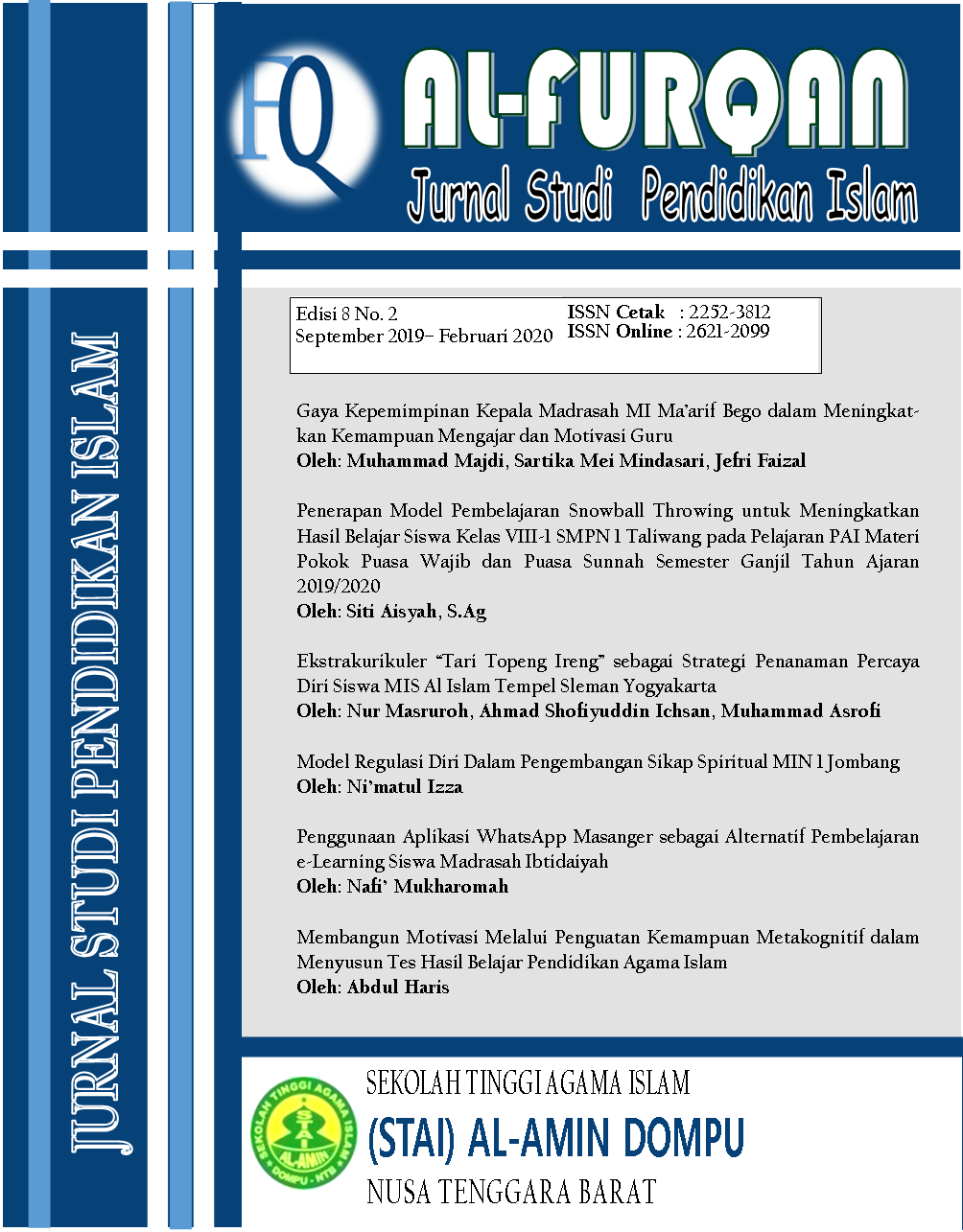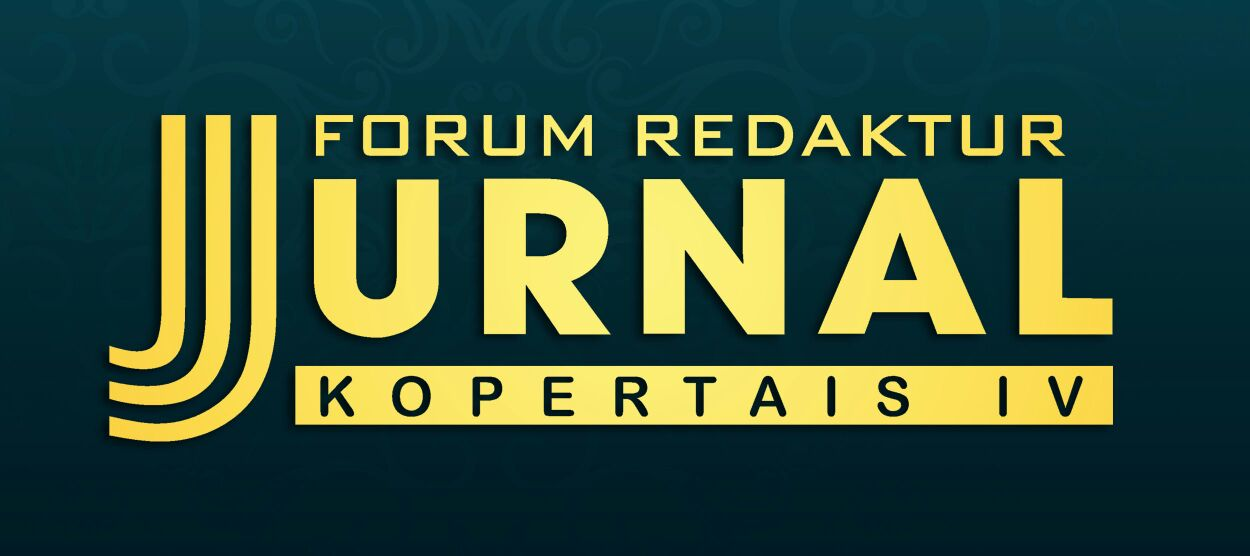Building Motivation Through Strengthening Metacognitive Ability in Compiling Islamic Learning Outcomes Tests
Keywords:
Motivation, Metacognitive, Islamic Religious Education Learning Outcomes Test
Abstract
Graduates of higher education are expected to have learning outcomes in addition to competencies that must be possessed, to enable graduates to perform a set of intelligent actions that are responsible for carrying out tasks in certain fields of work, as a condition to be considered capable by the community. Efforts to equip students to have such learning outcomes can only be done through learning activities that meet the learning process standards, such as the use of approaches or learning models that can increase student motivation. The learning model or strategy used in effective and meaningful learning can trigger the construction process of student motivation in obtaining learning outcomes. Effective and meaningful learning can provide satisfaction and increase student confidence. So that it can create conditions that trigger its concentration to use the information organization process and the process of adapting knowledge within itself. The abilities gained through meaningful learning activities will enrich the knowledge of students in their brains (schemata). The process of information organization occurs when the thought process connects the new knowledge encountered (assimilation) with the structure of knowledge in the brain (schemata). If the knowledge in the schemata structure is following the new information it faces, there will be a process of adaptation or integration of the received knowledge and changing the knowledge structure that is owned with the new knowledge structure (accommodation), which marks the balance (equilibrium). The level of student ability in the process of organizing information and the process of adapting knowledge differs from one another. Students who have cognitive intelligence tend not to experience difficulties in learning. Students who have a moderate to the low level cognitive process can compensate for their learning difficulties using their metacognitive skills. Strategies for strengthening metacognitive abilities can be used to support effective and meaningful learning. Metacognitive skills are a way of learning that activates cognitive processes (information organization and knowledge adaptation processes) in him. Metacognitive abilities can be used to solve learning difficulties by evaluating the completeness of knowledge in the schemata structure. Success in solving problems (learning difficulties) in preparing the PAI learning outcomes assessment instrument faced will give satisfaction to students so that they can construct motivation (motivation) from within students.References
Arikunto, S. 2009. Dasar-dasar Evaluasi Pendidikan. Jakarta : Bumi Aksara.
Baharudin & Esa Nurwahyuni. 2007. Teori Belajar dan Pembelajaran. Jogjakarta: Ar-Ruzz Media Group.
Dahar. 1991. Teori-teori Belajar. Jakarta : Erlangga.
Flavell, J. 1979. Metacognition and Cognitive Monitoring: A New Area of Cognitive Developmental Inquiry. American Psychologist, 34: 906 – 911.
Hamalik, Oemar. 2002. Psikologi Belajar dan Mengajar. Bandung: Sinar Baru Algensindo.
Hamzah B. Uno. 2011. Teori Motivasi dan Pengukurannya: Analisis di Bidang Pendidikan. Jakarta: Bumi Aksara
Jonassen, D. 2000. Toward a Design Theory of Problem Solving To Appear in Educational Technologi: Research and Depelopement. [online] http://www.coe.missouri.edu /~jonassen /PSPaper%20 final.pdf
Livingston, J. A. (1997). Metacognition: An Overview. (online) http://www.gse.buffalo.edu/fas/ shuell/CEP564/Metacog.html
Malone, L.K. 2007. The Convergence of Knowledge Organization, Problem-Solving Behavior, and Metacognition Research with The Modeling Method of Physics Instruction – Part II. Journal Physics Teacher Education.
Menristekdikti. RI. (28 Desember, 2015). Standar Nasional Pendidikan Tinggi. Peraturan Menteri Riset, Teknologi, dan Pendidikan Tinggi Republik Indonesia Nomor 44 Tahun 2015. Jakarta, Jakarta, Indonesia: Kemenristekdikti.
Presiden Republik Indonesia. (8 Juli, 2003). Sistem Pendidikan Nasional. Undang-Undang Nomor 20 Tahun 2003. Jakarta, Jakarta, Indonesia: Kemenristekdikti.
Presiden Republik Indonesia. (17 Januari, 2012). Kerangka Kualifikasi Nasional Indonesia. Peraturan Presiden Republik Indonesia Nomor 8 Tahun 2012. Jakarta, Indonesia: Menkumham.
Presiden Republik Indonesia. (10 Agustus, 2012). Pendidikan Tinggi. Undang-Undang Nomor 12 Tahun 2012. Jakarta, Jakarta, Indonesia: Kementerian Sekretariat Negara RI
Suryabrata, Sumadi, 2011. Psikologi Pendidikan, Jakarta: PT. RajaGrafindo Persada.
Tim Penyusun. 2008. Buku Panduan Pengembangan Kurikulum Berbasis Kompetensi Pendidikan Tinggi (Sebuah alternatif penyusunan kurikulum). Jakarta; Sub Direktorat Kurikulum dan Program Studi Direktorat Akademik Direktorat Jenderal Pendidikan Tinggi.
Tim Penyusun. 2014. Buku Kurikulum Pendidikan Tinggi. Jakarta; Direktorat Kurikulum dan Kemahasiswaan, Dirjen Dikti Kemendikbud.
Tim Penyusun. 2016. Buku Panduan Penyusunan Kurikulum Pendidikan Tinggi. Jakarta; Direktorat Pembelajaran Dirjen Pembelajaran dan Kemahasiswaan Kemenristekdikti.
Uno, Hamzah. 2007. Teori Motivasi dan Pengukurannya. Jakarta: Bumi Aksara.
Wells, A. 2009. Metacognitive Therapy for Anxiety and Depression. New York, NY: the Guildford Press. Woolfolk.
Baharudin & Esa Nurwahyuni. 2007. Teori Belajar dan Pembelajaran. Jogjakarta: Ar-Ruzz Media Group.
Dahar. 1991. Teori-teori Belajar. Jakarta : Erlangga.
Flavell, J. 1979. Metacognition and Cognitive Monitoring: A New Area of Cognitive Developmental Inquiry. American Psychologist, 34: 906 – 911.
Hamalik, Oemar. 2002. Psikologi Belajar dan Mengajar. Bandung: Sinar Baru Algensindo.
Hamzah B. Uno. 2011. Teori Motivasi dan Pengukurannya: Analisis di Bidang Pendidikan. Jakarta: Bumi Aksara
Jonassen, D. 2000. Toward a Design Theory of Problem Solving To Appear in Educational Technologi: Research and Depelopement. [online] http://www.coe.missouri.edu /~jonassen /PSPaper%20 final.pdf
Livingston, J. A. (1997). Metacognition: An Overview. (online) http://www.gse.buffalo.edu/fas/ shuell/CEP564/Metacog.html
Malone, L.K. 2007. The Convergence of Knowledge Organization, Problem-Solving Behavior, and Metacognition Research with The Modeling Method of Physics Instruction – Part II. Journal Physics Teacher Education.
Menristekdikti. RI. (28 Desember, 2015). Standar Nasional Pendidikan Tinggi. Peraturan Menteri Riset, Teknologi, dan Pendidikan Tinggi Republik Indonesia Nomor 44 Tahun 2015. Jakarta, Jakarta, Indonesia: Kemenristekdikti.
Presiden Republik Indonesia. (8 Juli, 2003). Sistem Pendidikan Nasional. Undang-Undang Nomor 20 Tahun 2003. Jakarta, Jakarta, Indonesia: Kemenristekdikti.
Presiden Republik Indonesia. (17 Januari, 2012). Kerangka Kualifikasi Nasional Indonesia. Peraturan Presiden Republik Indonesia Nomor 8 Tahun 2012. Jakarta, Indonesia: Menkumham.
Presiden Republik Indonesia. (10 Agustus, 2012). Pendidikan Tinggi. Undang-Undang Nomor 12 Tahun 2012. Jakarta, Jakarta, Indonesia: Kementerian Sekretariat Negara RI
Suryabrata, Sumadi, 2011. Psikologi Pendidikan, Jakarta: PT. RajaGrafindo Persada.
Tim Penyusun. 2008. Buku Panduan Pengembangan Kurikulum Berbasis Kompetensi Pendidikan Tinggi (Sebuah alternatif penyusunan kurikulum). Jakarta; Sub Direktorat Kurikulum dan Program Studi Direktorat Akademik Direktorat Jenderal Pendidikan Tinggi.
Tim Penyusun. 2014. Buku Kurikulum Pendidikan Tinggi. Jakarta; Direktorat Kurikulum dan Kemahasiswaan, Dirjen Dikti Kemendikbud.
Tim Penyusun. 2016. Buku Panduan Penyusunan Kurikulum Pendidikan Tinggi. Jakarta; Direktorat Pembelajaran Dirjen Pembelajaran dan Kemahasiswaan Kemenristekdikti.
Uno, Hamzah. 2007. Teori Motivasi dan Pengukurannya. Jakarta: Bumi Aksara.
Wells, A. 2009. Metacognitive Therapy for Anxiety and Depression. New York, NY: the Guildford Press. Woolfolk.
Published
2020-02-29
How to Cite
HARIS, A. Building Motivation Through Strengthening Metacognitive Ability in Compiling Islamic Learning Outcomes Tests. AL-FURQAN, v. 8, n. 2, p. 51-64, 29 Feb. 2020.
Section
Articles
Copyright (c) 2020 AL-FURQAN

This work is licensed under a Creative Commons Attribution-NonCommercial-NoDerivatives 4.0 International License.






